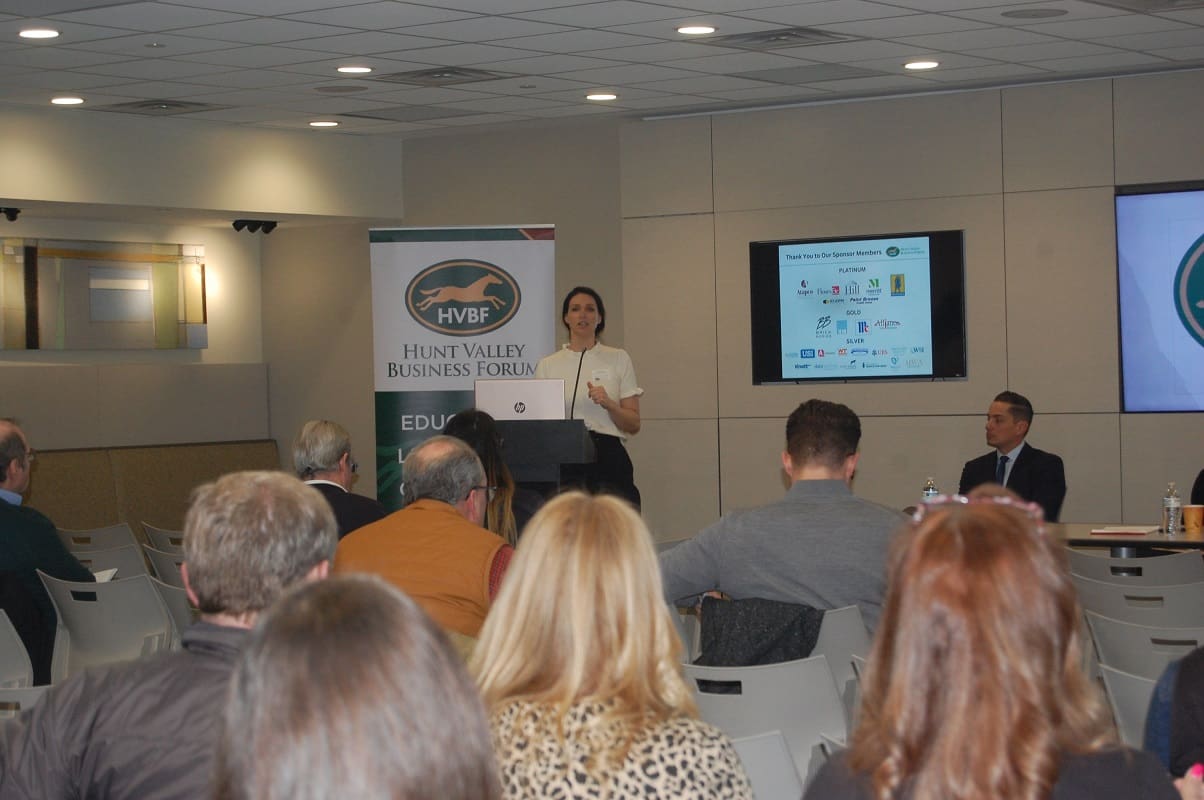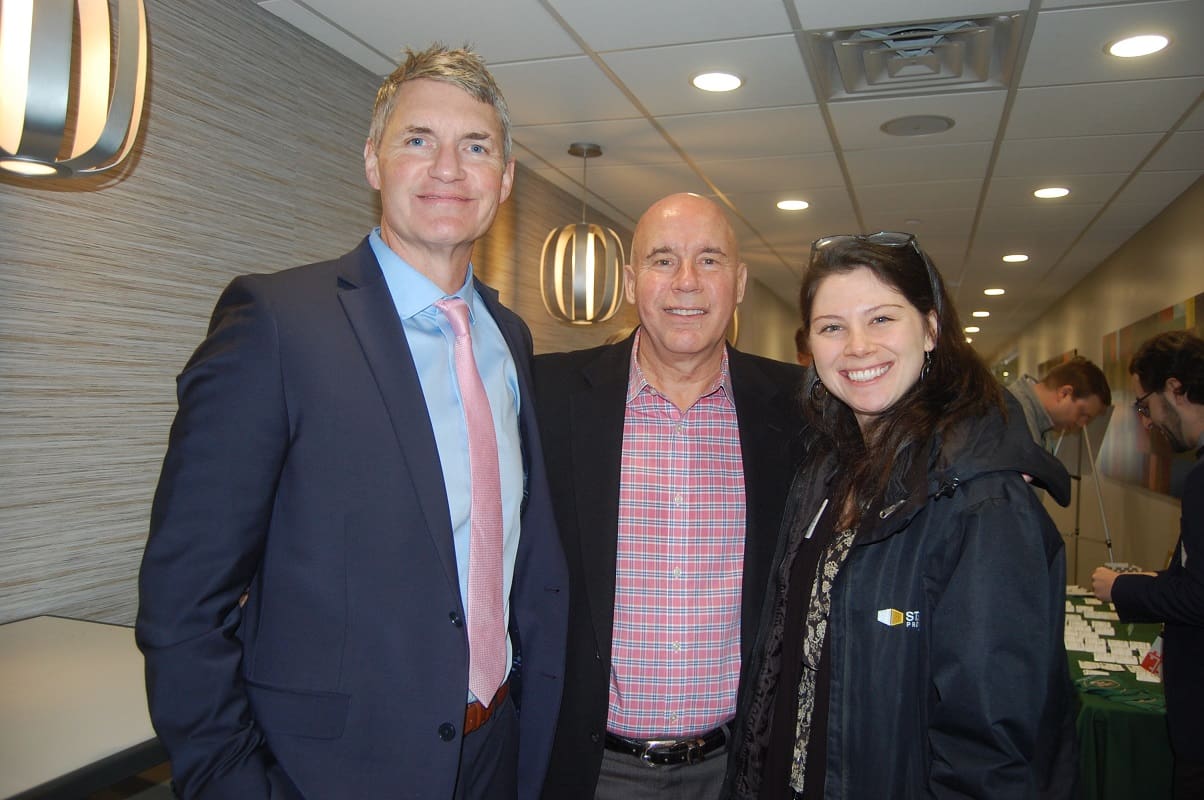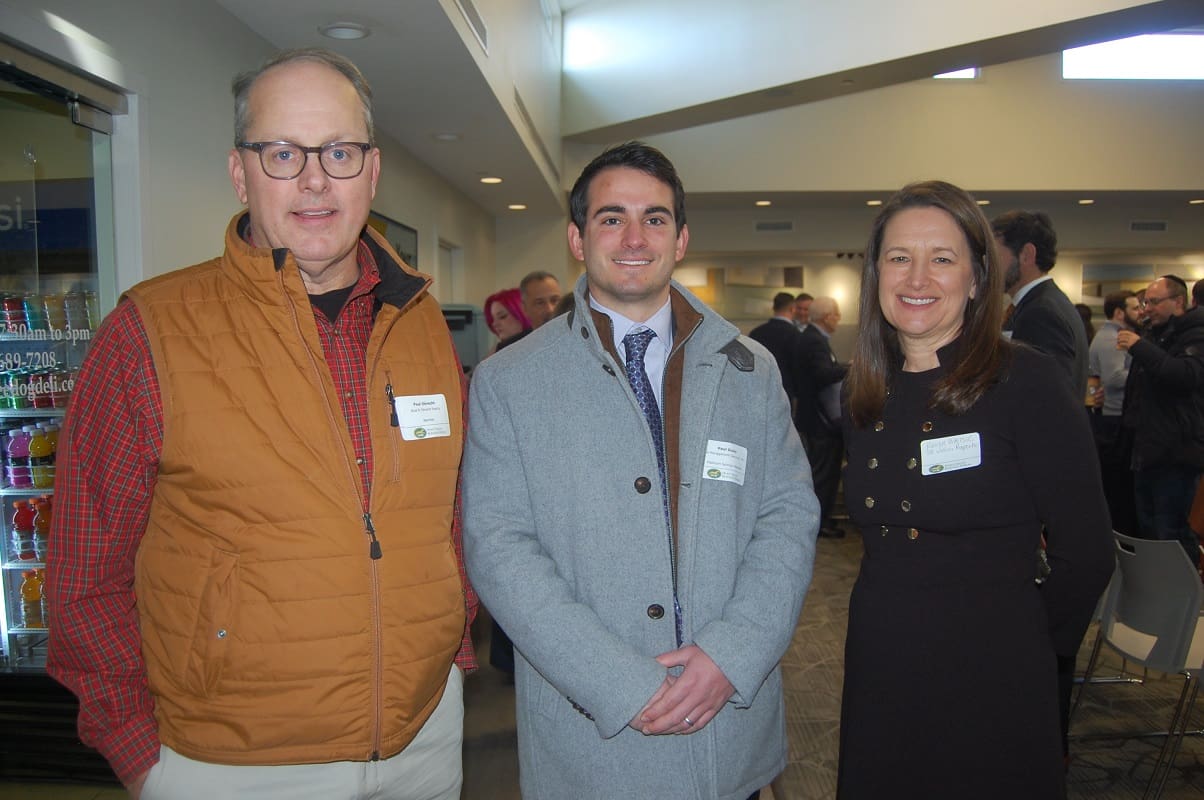
Ashley Zito, Hill Management Services; Trent Zivlovich, Whiteford, Taylor & Preston; Denise Kramer-Buchman, Executive Director, Hunt Valley Business Forum; Jennifer Busse, Rosenberg Martin Greenberg; Grason Wiggins, Harris Jones & Malone.
An overview of the Climate Solutions Now Act, and how the law passed in 2022 by the General Assembly is expected to impact Maryland-area real estate stakeholders and businesses, highlighted the Hunt Valley Business Forum’s Annual Public Policy Symposium, held at the Executive Plaza complex at 11350 McCormick Road in Hunt Valley.
Trent Zivkovich, Partner, Whiteford, Taylor & Preston provided commentary on the act which requires the State to reduce all greenhouse gas emissions 60 percent by 2031 and achieve net zero by 2045. Jennifer Busse, Partner, Rosenberg Martin Greenberg explained procedures related to Baltimore County’s four-year Comprehensive Zoning Master Plan process and Grason Wiggins, Attorney, Harris Jones & Malone discussed issues and bills expected to be debated at this year’s Maryland General Assembly session. The discussion was moderated by Ashley Zito, Vice Chair of the Hunt Valley Business Forum’s Public Policy Committee.

Ashley Zito
Maryland has enacted among the most rigorous state law in the country
According to Zivkovich, in Senate Bill 528, passed in 2022, Maryland has enacted one of the most rigorous state laws in the country related to new building energy and performance standards. In response, regulations proposed by the Maryland Department of the Environment (MDE) this past December would target energy use in commercial office buildings in order to “achieve net-zero greenhouse gas emissions by 2045.” The proposed regulations will apply to all commercial buildings exceeding 35,000 square feet of space, but excludes their associated parking areas, restaurants and food service establishments, primary and secondary schools, historic buildings and manufacturing and agricultural buildings.
Landlords and building owners will be required to begin annual benchmarking to record energy usage beginning in 2025, with an annual report covering the prior calendar year submitted no later than June 1, 2026.
It should be noted that the numbers first reported to MDE for 2025 is critical, as it will set a base line against how reduction efforts will be measured.
Under current law and proposed regulations, interim performance standards must be met beginning in 2030, with final performance standards taking effect in 2040. Failure to meet these standards will require the building owner to pay “alternative compliance fees” to the State.
The overall objective of the legislation is to reduce the need for additional electrical generation, transmission, and distribution facilities, as well as limit energy costs. The likely effect is the use of gas in buildings would be largely phased out, replaced by electric as the primary energy source.

Shawn Goldfaden, Land Services USA; Ketch Secor, CBRE; Stephanie Caronna, St. John Properties
Baltimore County’s Comprehensive Zoning Map process now underway
According to Baltimore County statutes, a comprehensive zoning map process occurs every four years, and presents the opportunity to request changes to existing zoning classifications. As part of the year long process, which opened this past August, the general public has the chance to testify at the public hearings which will be held before the Planning Board next month and then the County Council in June. Ultimately, decisions on all of the requests are made by the County Council no later than September 16, 2024.
Busse, a land use attorney for Rosenberg Martin Greenberg explained that several trends are expected to emerge this year including concerns about “commercial creep” into residential areas and the desire by businesses to convert land zoned for manufacturing uses to zones which allow for broader commercial uses for more versatility and flexibility. In an effort to encourage development companies to revitalize older shopping center assets, Busse explained that there is significant interest in the Commercial, Community Core (CCC) Overlay which allows for unlimited density.
She cautioned that “once a property is in play for a possible zoning change, anything could happen” based on the final decision of the County Council and, further, that since zoning lines need not match up with property lines, a single parcel may actually achieve two separate and distinct zoning classifications.
Busse also talked about recently introduced legislation by the County Council intended to facilitate the redevelopment of underutilized commercial properties. “This is being done in the hopes to incentivize developers to turn existing greyfield sites into thriving mixed-use projects which incorporate inclusionary housing,” Busse said.
This proposed legislation calls for providing density bonuses and relaxing parking requirements where a redevelopment project sets aside a percentage of residential units for households with an income at or below 60% of the area median income. “This legislation presents a significant opportunity where a project is bound by two or more transit sites,” she added.

Paul Obrecht III, Blue & Obrecht Realty; Paul Giulio, Hill Management Services; Karen Watsic, St. John Properties
Housing, labor and budget issues highlight Maryland General Assembly session
The State of Maryland has a revenue shortfall and, to help rectify this situation and achieve a balanced budget, a focus of the bills expected to be introduced at this year’s Maryland General Assembly will include new fees or fee increases targeting businesses and consumers.
Grason Wiggins of Harris Jones & Malone expects more than 3000 bills to be introduced during the 90-day session in Annapolis. “Housing is and remains a priority issue for lawmakers this year and we expect the introduction of several bills designed to encourage the development of rental housing,” Wiggins explained. “There is also an emphasis to provide density bonuses to developer building residential units around rail-served sites, to encourage the use of public transportation,” he added.
The Hunt Valley Business Forum is the fastest-growing association in Baltimore County for businesses in the greater Hunt Valley area. For more information and a list of upcoming events, please visit www.hvbf.org











